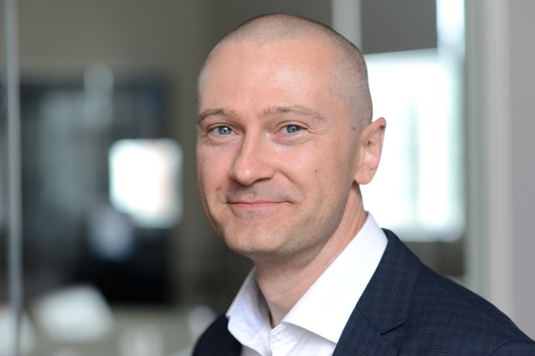 Russ Starke is CEO of Think Company, a service design and digital experience design and development firm based in Philadelphia that this year earned a place on the Philadelphia100® for the seventh time.
Russ Starke is CEO of Think Company, a service design and digital experience design and development firm based in Philadelphia that this year earned a place on the Philadelphia100® for the seventh time.
Russ been a professional designer for over 20 years, working with corporate and nonprofit clients as an award-winning digital strategist, experience designer, information architect, instructional designer, business analyst, and project manager.
Russ serves on the board of LEADERSHIP Philadelphia (Class of 2015), the Economy League of Greater Philadelphia, the Greater Philadelphia Chamber of Commerce, and as the executive chair of the Hospitality & Corporate Council for Broad Street Ministry, an organization dedicated to tackling homelessness and hunger in an innovative way by bringing public and private sectors together.
The Long Island, New York, native holds an M.S. from Bloomsburg University in Instructional Technology, a B.S. in Telecommunications from Kutztown University, and was an adjunct graduate faculty member and course designer for Philadelphia University’s Digital Design and Instructional Technology programs from 1999-2010.
Why are you an entrepreneur? I would probably say that I am a leader within an entrepreneurial organization, rather than an entrepreneur myself. However, our organization was created in response to, and remains a response to, the feeling my Think Company co-founders and I had that there wasn't a design and development organization we knew of that treated employees and serviced customers the way we thought it should, and could, be done. Working on providing and perfecting that example is intrinsically motivating for me. We certainly serve a need in the marketplace, but it might be more about how we serve that need.
What is service design?
Service design is the process of deliberately designing all of the touch points (digital and non-digital) that people use when interacting with a company or brand to achieve their goal -- in service of creating the best and most coherent experiences. It's about first considering, as objectively as possible, all of the individuals present in your ecosystem (customers, employees, administrators, executives, suppliers, etc.), to understand their unique wants, needs, pain points, and journeys. Then, based on that evidence, envisioning a better future for each of those personas, followed by identifying the mix of people, processes and products/services that will be necessary to make that future a reality.
Can you share an example of great design that we take for granted and/or design you find frustrating that you'd like to see changed?
Oh, great design is all around us, all the time -- and, in fact, one of the best ways to recognize it is to think of things that you don't typically pay attention to, that when they get disrupted, cause major inconveniences/issues: a traffic light goes out, you lose power in your home, your phone can't connect to a network, etc. The best design sort of dissolves into the background because it's so intuitive and so aligned with your needs and goals that you don't even really have to think about it. But these things that we've come to rely on so heavily in our daily lives do not happen by accident; they are the product of deliberate design thinking and smart, continuous refinement over time.
In my opinion, any interaction (digital or otherwise) that leaves a person confused, unsure of what just happened and/or what is going to happen next or thinking "why does this have to be so HARD?" is ripe for overhaul and redesign. Period. In our work, we see this most often when organizations grow to the point that they have so many channels/sites/methods for interacting with customers and employees (often a mix of newer and legacy technologies, different approaches that need to be normalized following mergers/acquisitions, perhaps redundancies and inconsistencies of content and interactions, etc.) that they spend more time troubleshooting and resolving issues than doing anything else.
How has being a member of EFGP helped you help your company succeed?
EFGP has been an invaluable resource of professionals from varied backgrounds and organizations sharing strategies for addressing all of the various challenges that business leaders face. There are a lot of groups out there that claim to provide this service (often for a hefty membership fee) but tend to degrade into homogenous echo chambers and/or pay-to-play audiences for thinly veiled sales pitches. I've really found value in the EFGP methodology of creating meaningful relationships through a mix of content presentation and working sessions and setting a high bar for content topics and providers. I have a notebook filled with follow-up tactics and ideas from the EFGP sessions I've attended.
Why is being recognized with the Philly100 important to your company? When you see the list of folks who make the Philly100 each year, it's hard not to say, "I want to be in that club.” Importantly, nobody can pay their way onto this list -- it only happens when you've been objectively successful in running the business, and therefore providing great value and opportunity in the Greater Philadelphia area and beyond. It meant a lot to us the first time we were included in 2011, and it hasn't lost any luster for us -- in fact, we're more humbled by it now with our seventh win(!) than probably ever before.
“Five Questions With…” is a series of interviews in which EFGP CEO Members share insights about their career journeys, their industries, and the value of EFGP membership. To learn how joining EFGP can help you grow your company, visit efgp.org.

